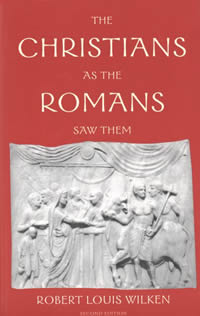Book Notes
 Robert Louis Wilken, The Christians as the Romans Saw Them (New Haven: Yale,
1984; second edition, 2003), 214pp.
Robert Louis Wilken, The Christians as the Romans Saw Them (New Haven: Yale,
1984; second edition, 2003), 214pp.
From its inception, the Jesus movement that later became known as Christianity had a deeply ambivalent relationship with its surrounding culture. On the one hand, Luke wrote that the first believers "enjoyed the favor of all the people" (Acts 2:47). But that genial state of affairs was short-lived. When Paul stood before King Agrippa, the governor Festus interrupted Paul's defense and screamed, "You are out of your mind, Paul! Your great learning is driving you insane!" (Acts 26:24). It's fair to say that this deep ambivalence between Christ and culture has never been resolved even to our own day, and that, perhaps, it never should be.
Robert Louis Wilken, professor of the History of Christianity at the University of Virginia, introduces the broad and deep antipathy that developed in the first five centuries toward the Christian movement, at least as that was expressed by the cultured elites. He presents the views of the pagan critics with both sympathy and understanding. In particular, he devotes one chapter each to the views of Pliny the Younger, the physician Galen, Celsus, the Neoplatonic philosopher Porphyry, and the Roman emperor Julian who was raised as a Christian but abandoned his faith to become a vociferous critic.
For about a hundred years the emergent Christian movement was invisible to most people in the Roman empire. But across the decades Christians earned a reputation as an alternate and anti-social community that existed on the margins of the state. They were fanatical, seditious, obstinate, and defiant. Tacitus called them "haters of mankind." They scorned long-held Roman religious traditions. Many of their adherents came from the lower classes and seemed gullible. They refused military service, and met for clandestine rites rumored to include cannibalism, ritual murder, and incest. All of which is to say, in the words of one critic, that the Christians "do not understand their civic duty." They actively undermined society with their indifference to civic affairs. As for their beliefs, Wilken highlights a cluster of Christian doctrines that drew the ire of pagan critics—miracles, the reliability of the Bible, the historical particularity of revelation, creation of the world out of nothing, the primacy of faith over reason, and Christianity's relationship to Judaism.
In his short epilogue, Wilken acknowledges that Christians responded to their critics: "There was a genuine dialogue, not simply an outpouring of abuse. The credit goes as much to the Christians as to the pagans." But credit also goes to the critics, for in their attacks they forced believers to clarify and develop their own intellectual tradition. Wilken concludes with advice that is just as timely today as it was two millennia ago: "Christianity needed its critics and profited from them."


